#roy cohn
Text
"rpf is fine" - tony kushner, angels in america
#is this funny#does anyone get this#roy cohn#ethel rosenberg#aia#angels in america#tony kushner#mine
451 notes
·
View notes
Text
*Kendall Roy voice* Your problem, uh, Henry, is that you are hung up on words, on fucking labels, OK? “Gay,” "homosexual", uh, fucking, uh, “carpetmuncher.”
241 notes
·
View notes
Text
i love that roy cohn is part of the AIDS quilt. “bully. coward. victim” is so powerful and does a really good job of succinctly acknowledging how damaging such a restrictive environment is and how that allowed someone like cohn to hold so much internalized homophobia that he spent his career outing other queer ppl
#fellow travelers#roy cohn#aids memorial#the first time i saw his square those three words hit me like a punch in the gut#and this is obviously not to excuse what he did. but you have to understand the context#he truly thought there was no other way for him to live#horrifying for everyone. even the ones with the supposed power
140 notes
·
View notes
Text
I’m obsessed with this like you wouldn’t BELIEVE
Source
#fellow travelers#tim laughlin#jonathan bailey#hawkins fuller#matt bomer#roy cohn#will brill#joseph mccarthy#chris bauer#tiktok#no church in the wild#hawk and skippy#hawk x tim
31 notes
·
View notes
Text
i'm watching angels in america and in the first episode, there's this scene where the politician roy cohn monologues about why he's not a homosexual despite exclusively fucking other men, and it like. PERFECTLY articulates something i've been thinking a lot about lately (funnily enough from having just watched fellow travelers which also featured a fictionalized roy cohn, and then looking into him and his insistence that he couldn't be gay because he was masculine, that he didn't have AIDS until he died of it - i had no idea he'd be in AiA though, that's a major coincidence)
basically, when a guy says something along the lines of "i'm not gay, i just have sex with men" and your instinct is to ask "lmao what do you think being gay IS": this is your answer. THIS is what they think being gay is. and the thing is that they're genuinely not completely wrong. are they harming themself? are they actively splitting their sense of self in half? are they almost definitely being horrible to other people too? yes and yes and yes, but for the time being, this is quite genuinely their concept of their gender, because Gay Man is a gender category. that's one of the many things that Gay Man is (it's also a factual description), but in terms of their identity and their place within the world, they're kind of right.
37 notes
·
View notes
Text

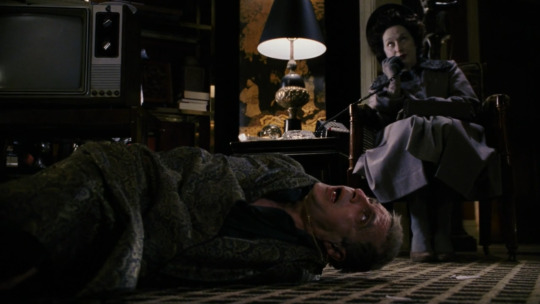

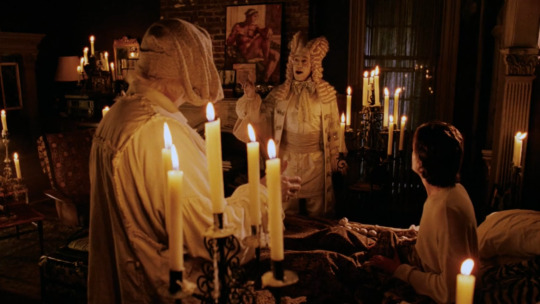
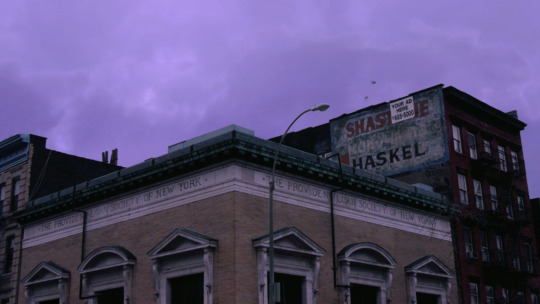
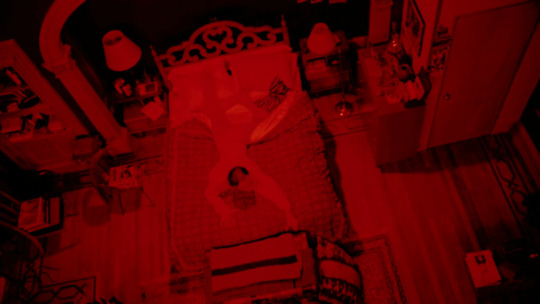

angels in america
millennium approaches: the messenger
director: mike nichols
cinematographer: stephen goldblatt
#angels in america#angels in america hbo#prior walter#harper pitt#louis ironson#joe pitt#belize#ethel rosenberg#roy cohn#justin kirk#mary louise parker#ben shenkman#patrick wilson#jeffrey wright#meryl streep#al pacino#emma thompson
164 notes
·
View notes
Text
I don't think we are talking enough abt jeremy strong playing ROY COHN... like. that is THEEE evil closeted right winger..... bully coward victim!!! I KNOW jeremy like broke into the studio through the wall cool aid man style when they just MENTIONED it. i wish his wife and everyone around him luck because he is going to be INSUFFERABLE for the entirety of 2024-2025. like he will unlock a secret yet underscovered level of insane. he will contract hiv and commit tax fraud.
26 notes
·
View notes
Text

Will Brill really gives Nathan Lane a run for his money, when it comes to fictional depictions of Roy Cohn.
Like, Brill really gets the voice, the mannerisms, the cowardice, the corruption, all spot on.
25 notes
·
View notes
Text
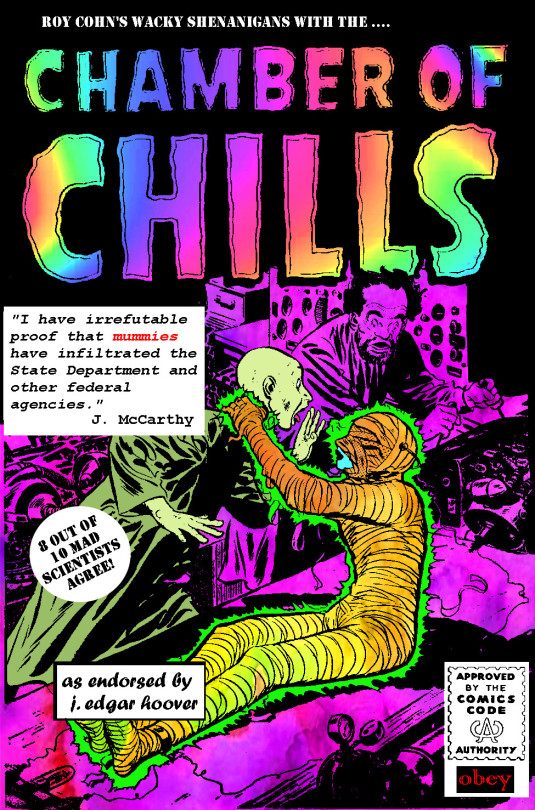
Roy Cohn's wacky shenanigans with the ...
Chamber of Chills
"I have irrefutable proof that mummies have infiltrated the State Department and other federal agencies." J. McCarthy
8 out of 10 Mad Scientists Agree!
as endorsed by J. Edgar Hoover
Obey the Comic Code Authority, puny Earthlings.
26 notes
·
View notes
Text
Colonel Martin's Closet
A common sentiment I've found across many reviews of The Patriot is that Benjamin Martin could be an interesting character if the filmmakers were not so concerned with presenting him as "good." The contrast between what Martin claims to believe and value, and what others believe about him, and his behavior is certainly stark. However, I find the insistence of Martin, his community, and the narrative as a whole that his violence does not define him, despite being the most consistent thing about him, to be precisely what makes this character interesting.
It becomes clear early on that Martin has been keeping a secret from his family concerning his service in the French and Indian War more than a decade prior to the start of the film. The first allusion to this secret comes when a fellow Patriot expresses surprise that opposition to the impending American Revolutionary War arises from "the same Captain Benjamin Martin whose fury was so famous during the Wilderness Campaign." Martin's only reply is "I was intemperate in my youth." Yet less than twenty minutes of run time later we find him sitting on a British regular's back while hacking into his shoulders and neck with a tomahawk and screaming. Both of these scenes are witnessed by Martin's eldest son Gabriel, on whom the camera lingers in the aftermaths. Later, that son makes the observation, "Wherever you go, men buy you drinks because of Fort Wilderness. Strangers know more about you than I do." Up to this point, Martin has constructed a wall to separate his life as a soldier and his life as a father. Or, rather, several walls. And a door.
In Epistemology of the Closet, a foundational text in queer theory, Eve Sedgwick writes of the closet that "a whole cluster of the most crucial sites for the contestation of meaning in twentieth-century Western culture are consequentially and quite indelibly marked with the historical specificity of homosocial/homosexual definition, notably but not exclusively male, from around the turn of the century. Among these sites are, as I have indicated, the pairings secrecy/disclosure and public/private" (72). The Patriot's subject matter predates the historical specificity Sedgwick delineates, but the film's writing does not. Indeed, given its rampant historical inaccuracies, The Patriot may be said to tell us more about the early 21st century than the 18th one. It is no secret that Martin is a soldier, but the particular kind of violence he engaged in previously breaks containment over the course of the film even as most others' recognition of it does not. I want to propose that the closet is a particularly apt metaphor for the ways Martin's crimes are separated from his identity.
Just as the closet can manifest in different ways, so there are different ways to occupy it. Particularly striking examples of two of them can be found in Tony Kushner's two-part play from the early 90s, Angels in America. Joe Pitt rejects his desire for other men, not giving into it until halfway through the play, because he believes it is sinful. When his wife asks what he prays for, he replies, "I pray for God to crush me, break me up into pieces and start all over again" (Millennium Approaches, II, ii). An earlier attempt at disavowal finds him asking "Does it make any difference? That I may be one thing deep within, no matter how wrong or ugly that thing is as long, as I have fought with everything I have to kill it?" (Millennium Approaches, I, viii). Joe hopes to find salvation in inaction, but ultimately cannot maintain this resolve. Still, the conviction that action will damn him remains sincere. Before going home with his soon to be lover Louis, Joe tells him, "I'm going to Hell for doing this" (Millennium Approaches, III, vii). Joe uses the closet to conceal a part of himself of which he is deeply ashamed, that he has fought, unsuccessfully, to rid himself of. Joe's mentor Roy Cohn, though, insists that his actions do not define him because of his political standing, his "clout." When his doctor diagnoses him with AIDS, he says, "Your problem, Henry, is that you are caught up on words, on labels, that you believe they mean what they seem to mean." Later in this scene, he clarifies:
"I have sex with men. But unlike nearly every other man of which this is true, I bring the guy I'm screwing to the White House and President Reagan smiles at us and shakes his hand. Because what I am is entirely defined by who I am. Roy Cohn is not a homosexual. Roy Cohn is a heterosexual man, Henry. Who fucks around with guys" (Millennium Approaches, I, vi).
There is no shame in Roy's closet. There is instead contempt for other gay men: "Homosexuals are men who in fifteen years of trying cannot get one pissant antidiscrimination bill through City Council." While Joe fears action for the impact it will have on his identity as a married Mormon Republican man, Roy insists that no such connection exists. He believes he can do as he pleases with impunity and his community will keep the secret, as he coerces his doctor to do.
Early on in The Patriot, Martin's way of inhabiting the closet appears to have more in common with Joe's. When he discovers that his son Thomas has gone into his room and opened his trunk full of French and Indian War memorabilia to put on his red British Colonial Army coat, not only does he immediately insist on taking it off of him, but he does not look at it until the end of the scene. When Thomas asks, "What happened at Fort Wilderness?" Martin cannot make eye contact with him and says, "Put it away." What is a trunk but a horizontal closet? And yet this closet serves two purposes for Martin. It conceals these souvenirs from his past, yes, but it also assures that he knows exactly where they are and can access them quickly when he needs them. This is also true of Martin's relationships with the men who fought with him in the previous war, as we see when he is recruiting men in the tavern later. One acquaintance asks Martin if he is paying any bounties, and Martin responds: "No scalp money this time Rollins, but you can keep or sell back to me the muskets and gear of any redcoat you kill." Not only does Martin easily, even flippantly, confirm what is arguably the most shocking of his past actions, but he is offering to do it again with one important modification. He is no longer trafficking in human remains, but he has no qualms about incentivizing murder. Where did his shame go? Like Roy Cohn, Martin has no problem discussing his "secret" with men who already know it. And Rollins is certainly not going to judge Martin; they are allies, and the relationship is mutually beneficial.
Martin's allies support him in more ways than one. In addition to giving him space to operate outside the closet, they also aid in its maintenance. As Sedgwick writes, "'Closetedness' itself is a performance initiated as such by the speech act of a silence--not a particular silence, but a silence that accrues particularity by fits and starts, in relation to the discourse that surrounds and differentially constitutes it" (3). Coming out is not an autonomous, individual action. Much depends on the response of those who witness the silences and confessions, whose response shapes the speech act as much as those whose secret it reveals or conceals. When Gabriel follows his younger brother in asking about Fort Wilderness, Martin answers by telling the whole story. If he may be said to truly "come out" anywhere, it is here: "And not a day goes by that I don't ask God's forgiveness for what I did." As much as Martin centers his current feelings at the expense of his past actions, as much as he'uses collective pronouns when describing those actions--as though he was part of a committee rather than a commanding officer--he does, at the very least, own that he did something wrong. But Gabriel's response is quite telling: "Thomas was my brother as well as your son. You may not believe this, but I want satisfaction as much as you do." This has nothing to do with Martin's confession. It is not even in the same stratosphere as Martin's confession. Like so many loved ones of LGBTQ people in response to their acts of coming out, Gabriel does not accept or condemn what his father has revealed about himself. He simply changes the subject. This scene is comparable to the one in Angels in America when Joe makes a drunken call to his mother in Salt Lake City to tell her "I'm a homosexual," and she responds with "Drinking is a sin! It's a sin! I raised you better than that." (Millennium Approaches, II, viii).
For all these similarities in characters' interactions, The Patriot and Angels in America's uses of the closet could not be more different. When Joe's relationship with Louis comes to an abrupt end, he tries to return to the safety and familiarity of his marriage only to find that his wife is leaving him. Roy, whose body is already marked by Kaposi sarcoma lesions when he meets with his doctor in the first play, is dead from the disease he himself connects with the group he refuses to acknowledge his inclusion in at the end. Ultimately, they are unable to detach identity from action. Martin can, not only owing to his loved ones' cooperation but to the narrative's.
Of course, the main point of contrast to Martin's closetedness is the open-ness of his antagonist Colonel Tavington, who kills both Thomas and Gabriel by the end of the film. Tavington's words, actions, and identity exist in seamless unity with one another. Most of the war crimes shown onscreen are carried out on his orders; he speaks violence into existence. Moreover, those in his community do nothing to conceal his crimes: quite the opposite. In a deleted scene, Cornwallis tells Tavington in a tent full of British officers, "General O'Hara informs me that you've earned the nickname 'The Butcher' among the populace." Not only does Cornwallis uncritically accept that Tavington's behavior warrants such a name, but he assures that all of his officers know of Tavington's actions. Yet neither here nor elsewhere does Tavington deny or diminish his application of violence. And he is aware of the consequences. When he argues to Cornwallis that "brutal" tactics are necessary to capture Martin, he also acknowledges, "If I do this, you and I both know I can never return to England with honor" before asking for land on the frontier, beyond the reach of British law. The closet has not been built that could contain Tavington.
Martin's nickname evokes his closetedness as much as Tavington's does his outness. His actions at Fort Wilderness included both cutting Cherokee and French men's bodies into pieces and distributing those pieces, butchery in the most literal sense of the word. Yet his nickname, first coined by Tavington himself, is "The Ghost," an allusion to his way of appearing out of nowhere to surprise the British forces far more than what he does to them afterwards. Not only are Martin's past victims erased from the narrative, but his present ones are wholly silent on the subject of his violence except, ironically, Tavington, who has to remind his superior that Martin "has killed [eighteen] officers in the past two months" when General O'Hara stops him from drawing his sword on Martin. Perhaps it is not surprising that he sees the truth about him so much more easily than others. The wider Martin's closet door creaks open, the more what we glimpse within resembles Tavington, red coat and all.
Tavington does play some role in the opening of that door, and it is the same role Louis Ironson plays in coaxing Joe Pitt out of the closet and into his bed. Joe knows he is gay long before he meets Louis, just as Martin's taste for violence is well established more than a decade before he encounters Tavington, but these meetings with men who are already "out" create ideal opportunities for Joe and Martin to give in to the desires they have repressed. Ironically, it is during his fight with Tavington at the end of the film, the consummation of the bloody courtship carried out between them since Tavington recognized Martin at the prisoner exchange, that Martin chooses to shut the closet door from the inside. After stabbing Tavington through the torso, the same way he killed Gabriel, Martin tells him, "My sons were better men," and puts a bayonet through his throat. This is not about gratifying his own desire for violence; it is just about avenging his sons. The sons his closet protected him from, whose refusal of knowledge reinforces that very closet, have the final word on defining who their father is. Benjamin Martin is not a war criminal. Benjamin Martin is a war hero. Who likes to kill men in rapey ways.
The final few scene of the film only serves to reinforce how little Martin has changed. He returns home to his children to marry their aunt and produce more "good stock." The final scene reveals his men building him a new house in the exact spot where the one Tavington burned once stood. This house will no doubt contain a new trunk that itself will contain the weapons he used in the American Revolutionary War, waiting for an opportunity when violence, once again, proves the only option. Martin is able to inhabit the closet in a way Roy Cohn can only dream of. Roy believes other Republican lawyers will help keep his secret; instead, they rejoice at his demise. And when he dies, his mourners consist of two out gay men who detest him and the ghost of a woman he helped the state murder. The historical Roy Cohn is remembered as much for dying from AIDS as for anything he did in his lifetime; his panel on the AIDS Memorial Quilt is inscribed with the words "Bully, Coward, Victim." Kushner chose to include a characterization of Roy Cohn because his failure to remain closeted in death so well illustrates the play's themes surrounding the difficulty of change, the importance of community, and the inevitability of progress.
The men on whom Benjamin Martin is based have fared better than Roy Cohn thus far, though that is changing. They are honored in history books and by statues and plaques and the names of universities. It is only in recent decades that the racist acts accompanying their fight for freedom from tyranny have been brought to light as worthy of public as well as academic attention. The Patriot represents an argument against this type of outing. What does it matter that these men who fought for American freedom may have done unsavory things to win it? Is it not better to keep that part secret to better appreciate what they were able to accomplish? It does matter, and it is not better to hide it, because to do so erases the histories and silences the voices of those whose lives were destroyed by the victors' hunger for power, namely Native and Black Americans, and how is that not tyranny in itself?
#the patriot#eve sedgwick#angels in america#the closet#benjamin martin#william tavington#joe pitt#roy cohn#leave it to ben martin to be the first man ever#to go back in the closet#while he's inside another man
11 notes
·
View notes
Text

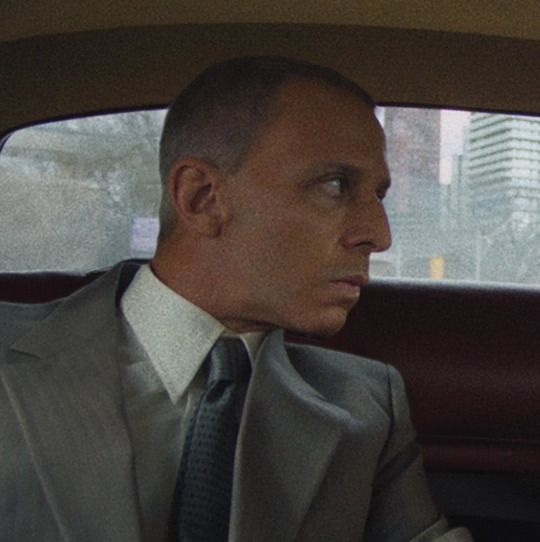
7 notes
·
View notes
Text

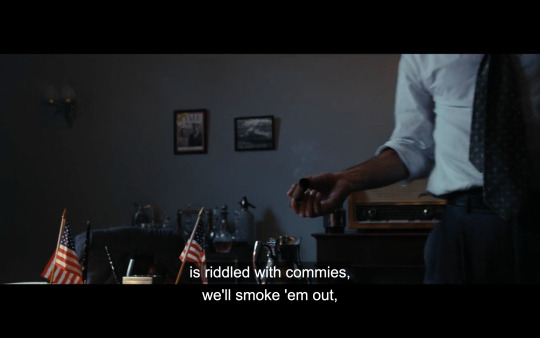
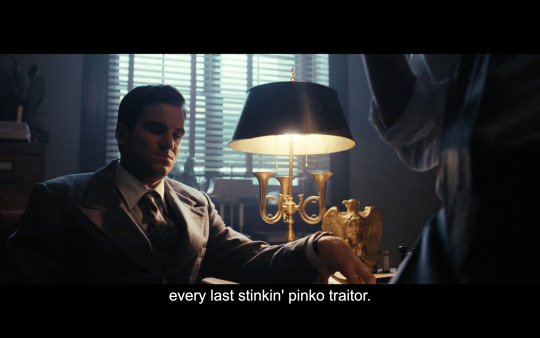




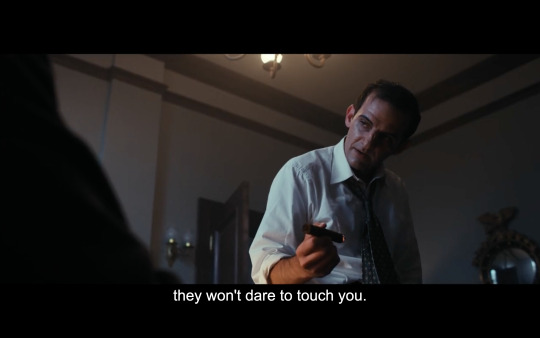
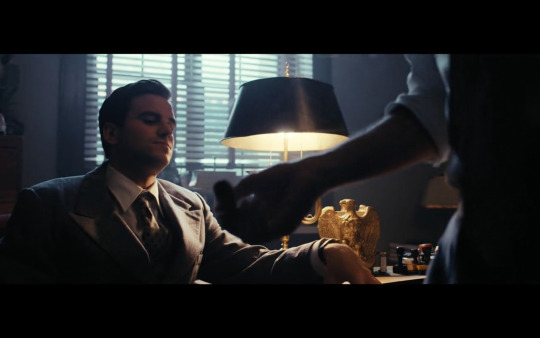





well.
12 notes
·
View notes
Text










“Donald Trump may have been caught by the FBI engaging in espionage. A former U.S. president. ENGAGING IN ESPIONAGE.
Let that sink in.”
It is possible that there might be a better non-circumstantial case for treason against the Trumps (all of the Trumps involved, including Jared & Ivanka, and the “First” “Lady,” Melanoma) than there was against the Rosenbergs.
Paging Roy Cohn! Paging Roy Cohn!
#politics#donald trump#republicans#traitors#mohammed bin salman#espionage#treason#vladimir putin#putins bitch#roy cohn#rosenbergs#the rosenbergs#spy family#saudi arabia#mbs#tre45on
186 notes
·
View notes
Text
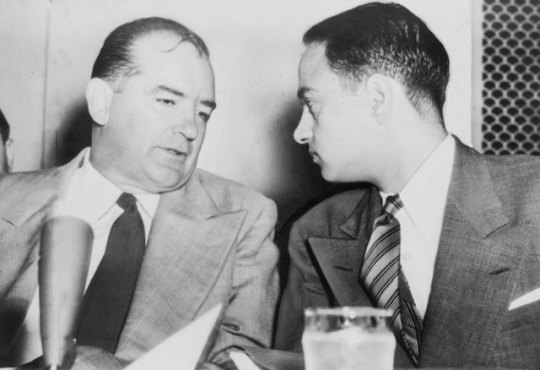
While the shadow Senator Joseph McCarthy left over the latter half of the 20th century in the United States is largely unavoidable, what is less well known are the circumstances under which his infamous witch hunts under the umbrellas of the Red and Lavender Scares (where he pursued people with real or imagined communist or lgbtq leanings) came to a close.
This itself is a story with several contributing factors.
McCarthy's Chief Counsel was a lawyer by the name of Roy Cohn (on the right on the main image, McCarthy on the left), a virulent anti-communist who was also the chief prosecutor for the Rosenburg Spy Case (arguing successfully for their executions despite even J Edgar Hoover thinking executing a mother with two young children would be unpopular). He was also a closeted homosexual, although his own leanings were an open secret among the US government, not that this deterred him from purging the US government of suspected gay and lesbian people (leading to 5000 people getting fired from their jobs).
Now, in November 1953, one of Cohn's associates by the name of G. Davies Schine (with whom Cohn had toured Germany previous to remove books by suspected communist authors from United States Information Agency libraries) was drafted into the US army. Cohn and McCarthy attempted to use their influence to pressure the army into having Schine stationed near to them in the US (some have read this as Cohn wanting his friend close by, others have suggested they were romantically involved, no confirmation is available that I can see, either way preferential treatment was demanded), and when the army told them no, the pair decided to threaten the army by turning their anti-communist hunts against them in retaliation.
And if you'd think that threatening the United States army in the early 1950s, when a former WWII general Dwight D. Eisenhower was president was a poor decision, you'd be right!
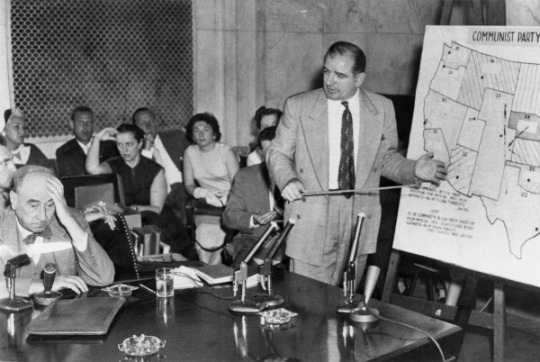
As such, in early 1954 the Senate Permanent Subcommittee on Investigations, usually chaired by McCarthy himself, was given the task of investigating whether McCarthy had indeed improperly sought preferential treatment. And unlike some of the other trials, the decision was made by ABC to televise the hearings, giving the American public their first view of what McCarthy's hearings were actually like as he turned his standard tricks against the army prosecutors.
You'd be right in thinking that it was more than a touch cynical that what it took to turn America against McCarthy was him attacking white, straight army dudes, but nevertheless that's what happened.
The army hired Boston lawyer Joseph Welch to make its case. At a session on June 9, 1954, McCarthy charged that one of Welch's attorneys had ties to a Communist organisation (the attorney in question, Fred Fischer, had been a member of the progressive National Lawyer's Guild). As an amazed television audience looked on, Welch responded with the immortal lines that ultimately ended McCarthy's career: "Until this moment, Senator, I think I never really gauged your cruelty or your recklessness." When McCarthy tried to continue his attack, Welch angrily interrupted, "Let us not assassinate this lad further, senator. You have done enough. Have you no sense of decency?".
Public support began to immediately drain from McCarthy, helped along by such things as the pioneering TV documentary series See It Now, where journalist Edward R Murrow (picture below) used clips of McCarthy's own behavior to underline how the senator had been exploiting the public's fear and spreading lies (such as implying the FDR and Truman administrations were treacherous) for his own political gain.
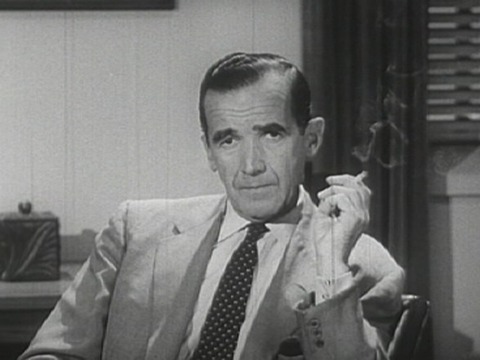
(Transcript of the episode here)
McCarthy was cleared of the charges, with sole responsibility being laid at the feet of Cohn, who resigned. By March of 1954, Joe's own Republican base in his home state of Wisconsin launched the Joe Must Go campaign, wishing to oust the senator for disrespecting the army, President Eisenhower, and for ignoring the plight of local dairy farmers facing price-slashing surpluses (y'know, the kind of issues he was elected to deal with rather than wandering around the United States harassing people for being gay, communist or being a gay communist).
He was eventually censured by the Senate on various charges that essentially amounted to making his colleagues look bad by association, and his political career limped along for a further two and a half years before finally dying of "Hepatitis, acute, cause unknown" on May 2, 1957. A diagnosis possibly made worse by both his heavy drinking and morphine addiction.
Schine, for his part in the proceedings, dropped out of politics following the hearings, where he entered the private sector, where among other things he made a cameo appearance in the 1966 Batman show (the Entrancing Dr Cassandra). He would eventually die in 1996 alongside his wife, and their 35 year old son in a private airplane accident.
And what of Roy Cohn... Well... While there are folk who'd go through an experience like this and try to either fade into obscurity or try to improve their image, Roy was not one of those people. He worked for the Mob in New York, the Catholic Church, Rupert Murdoch... and Donald Trump.

Cohn gathered a reputation for being willing to do whatever he felt was necessary to enrich either himself or to get his clients whatever they desired. This eventually led to his getting accused of theft, obstruction of justice, extortion, tax evasion, bribery, blackmail, fraud, perjury, and witness tampering. Indeed, Cohn's willingness to happily commit crimes for his clients has reportedly led to frustrations with Trump's recent legal trouble, with him being annoyed his current legal representatives aren't willing to do criminal stuff for them like Roy did back in the day.
Despite all of this though, Cohn remained a popular figure in conservative politics, even introducing Roger Stone to Trump, and was notably close friends with Ronald and Nancy Reagan, with whom he acted as an informal advisor and even ran Ron's presidential campaign in New York, Connecticut and New Jersey.
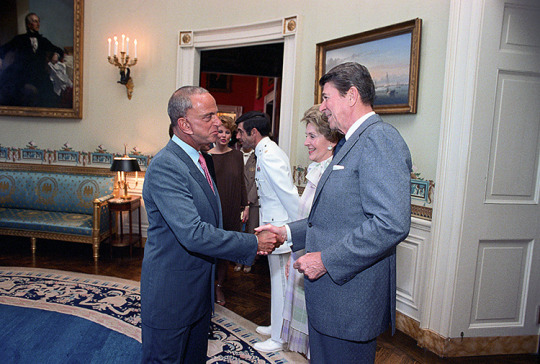
In 1986, Cohn was disbarred for, among other things, attempting to forge a client's will to make himself the beneficiary upon their death. On 2 August of that year, he died of complications from AIDS, having been cut off by Trump despite Cohn's loyalty (and help with lucrative mob contracts) over the years.
The IRS promptly seized his property, due to his owing the US government $7million in back taxes.
#irregular incidents#the cold war#crime#joseph mccarthy#roy cohn#history#american history#american politics#lgbtq#batman 1966
30 notes
·
View notes
Text
I cannot wait for this awards season to be over so I can finally put succession behind me and finally be a normal jeremy strong stan (and by normal i do mean being an extremely annoying and insufferable d*ck-rider for his other projects)

7 notes
·
View notes
Text

Sebastian Stan Cast as Young Donald Trump in movie The Apprentice alongside Jeremy Strong from filmmaker Ali Abbasi [X]
8 notes
·
View notes